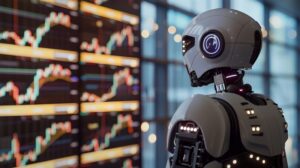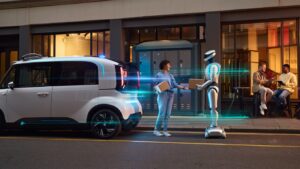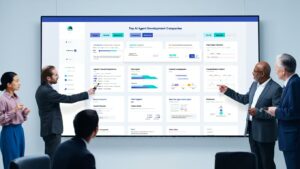- Tech giants like Google, Amazon, and OpenAI are leading the AI revolution by investing heavily in AI technologies, while AI startups in healthcare and fintech are rapidly disrupting traditional industries.
- Industries like traditional retail, agriculture, and education are struggling to keep pace with AI adoption due to infrastructural challenges, high costs, and slow integration of AI technologies.
- The future of AI will create winners and losers, with sectors like healthcare and finance poised for continued success, while industries slow to adapt may face obsolescence without significant investment in AI innovation.
The Rapid Rise of AI: Redefining Industries and Driving Change
The AI evolution is reshaping industries at an unprecedented pace. From healthcare to finance, companies are integrating AI to drive efficiency, make better decisions, and unlock new value. This powerful shift isn’t limited to tech behemoths; smaller enterprises are also finding ways to harness AI. But not every industry is adapting as quickly. While some are reaping significant rewards from AI adoption, others are facing challenges, whether due to outdated infrastructure, insufficient resources, or resistance to change.
In this article, we will explore the sectors that are thriving in this AI-driven world, as well as those that are struggling to adapt. From healthcare and manufacturing to retail and public services, we’ll dive into how AI is impacting various industries, which companies are emerging as leaders, and which are lagging behind. We’ll also examine the broader implications of AI on global economies and explore which industries may face extinction if they fail to innovate.
Winners: Industries and Companies Leading the AI Revolution
Tech Giants and AI Startups
Leading the charge in the AI evolution are tech giants like Google, Amazon, and OpenAI. These companies have invested billions into developing AI technologies, driving innovation in areas such as natural language processing, autonomous systems, and cloud-based AI solutions. For instance, Google’s DeepMind continues to break new ground in AI research, while Amazon’s AI-driven logistics and recommendation systems have revolutionized the e-commerce landscape.
Simultaneously, AI startups are thriving, especially in sectors like healthcare and fintech. Companies like Tempus in the healthcare space are using AI to transform medical data analysis, improving patient care through personalized treatments. In fintech, companies like Lemonade are utilizing AI for claims processing and fraud detection, offering consumers faster and more efficient financial services.
Healthcare
AI is making significant strides in healthcare, transforming how diagnoses are made and treatments are developed. Medical imaging is one of the most profound applications, where AI tools are outperforming human radiologists in detecting certain cancers. AI-driven solutions are also speeding up drug discovery processes, helping pharmaceutical companies to develop medications faster than ever. Furthermore, predictive analytics in patient care is improving outcomes by identifying at-risk individuals and recommending preemptive treatments, making healthcare both more efficient and more personalized.
Finance
The finance industry has been quick to adopt AI, using it to enhance fraud detection, provide personalized banking experiences, and execute algorithmic trading. AI systems in banking analyze customer data to offer tailored financial advice, while AI in stock markets enables high-frequency trading that reacts to market changes faster than any human could. These innovations are not only improving customer satisfaction but also driving profitability in ways previously unimagined.
Manufacturing
Manufacturing is one of the most AI-empowered industries, with automation and AI-enhanced predictive maintenance leading the charge. AI is optimizing supply chains by analyzing data from production processes, predicting equipment failures before they happen, and helping companies avoid costly downtime. Robotics and AI-driven systems are also streamlining production lines, reducing human error, and increasing output, all while lowering costs.
Losers: Sectors Struggling with AI Adoption
Traditional Retail
While e-commerce giants are thriving by leveraging AI-driven technologies for personalized shopping experiences, traditional brick-and-mortar stores are struggling to keep pace. The retail industry has seen major disruptions due to AI-enhanced platforms like Amazon, which use machine learning to manage inventory, recommend products, and enhance customer service. Many physical stores, particularly smaller businesses, lack the resources to adopt these advanced technologies, leading to store closures and declining sales as they struggle to compete.
Agriculture
The agriculture sector has been slower to adopt AI, mainly due to infrastructural challenges and high upfront costs. While AI can revolutionize farming by optimizing crop yields, predicting weather patterns, and automating machinery, many farmers are hesitant to invest in AI-driven solutions. The industry’s reluctance to embrace AI is largely due to insufficient technological infrastructure in rural areas and concerns over the return on investment, especially for small-scale farmers.
Education
AI adoption in education has been uneven. While AI has the potential to revolutionize personalized learning, many institutions face significant barriers to its implementation. The digital divide plays a major role in this, with some schools and universities unable to afford or integrate AI technologies. Additionally, resistance to change and the need for substantial teacher retraining have contributed to the slower adoption rates, leaving education systems struggling to keep up with AI-enhanced learning methods.
Public Sector & Government
Government agencies and public services have also been slow to adopt AI. Bureaucratic delays, budget constraints, and outdated technological infrastructure hinder AI implementation in the public sector.
While some agencies are experimenting with AI for data management and cybersecurity, most struggle to integrate these technologies at scale. As a result, they risk falling behind in efficiency and service delivery compared to the private sector.
The Role of AI in Creating Disruptors and New Opportunities
AI Startups Disrupting Traditional Markets
AI startups are leading a wave of disruption across traditional industries. Uber, for example, has used AI to disrupt transportation by improving ride-matching algorithms and optimizing routes, while Airbnb has disrupted hospitality through AI-enhanced pricing models and customer service. These companies are rapidly outpacing traditional players by using AI to create more efficient, user-centric services. Other sectors, such as insurance and media, are witnessing similar shifts, with AI-driven companies offering faster, more personalized, and more competitive services than their traditional counterparts.
Opportunities in AI for Small and Medium Enterprises (SMEs)
AI is not just for the tech giants—small and medium-sized enterprises (SMEs) are also finding opportunities in AI. Affordable AI tools are enabling smaller companies to compete in areas like marketing automation, customer service, and data analytics. For instance, chatbots powered by AI are allowing SMEs to provide 24/7 customer support without the need for large teams. Similarly, AI-driven marketing platforms are helping businesses optimize campaigns, target the right audiences, and improve conversion rates.
AI’s potential to level the playing field for SMEs is immense, providing them with tools that were once only accessible to large corporations with big budgets.
Challenges of AI Adoption: Who’s at Risk of Falling Behind?
Ethical Concerns and AI Regulation
One of the major barriers to AI adoption is the ethical concerns surrounding its use. Issues like privacy, job displacement, and biases in AI algorithms are causing industries to hesitate. For instance, sectors like healthcare and finance, where sensitive personal data is prevalent, face potential legal and social implications when deploying AI. The lack of clear regulatory frameworks adds to the uncertainty, with companies wary of adopting AI too quickly due to fears of future legal repercussions.
Skills Gap and Workforce Displacement
The AI evolution is also creating a significant skills gap in industries that are slow to train their workforce. Many sectors are struggling to find professionals skilled in AI technologies, which is delaying AI integration. For industries heavily reliant on manual labor, such as manufacturing and retail, AI poses the additional threat of workforce displacement. As automation takes over more roles, companies must find ways to retrain their employees, ensuring that AI adoption doesn’t lead to mass job losses.
- Workforce Retraining: Industries must prioritize upskilling to avoid a workforce unprepared for AI integration.
- Investment in AI Training Programs: Encouraging continuous learning in AI and related technologies is key to ensuring businesses don’t fall behind.
Future Outlook: Who Will Thrive, and Who Will Fall Behind?
As AI continues to evolve, industries that adapt and innovate will thrive, while those slow to change risk falling into obsolescence. Sectors like healthcare, finance, and tech are well-positioned to continue leading the charge, benefiting from AI’s growing capabilities. Meanwhile, industries like traditional retail and agriculture may face extinction if they don’t invest in AI-driven technologies.
However, it’s not all bleak for industries at risk. By focusing on retraining employees, investing in AI infrastructure, and staying open to innovation, even lagging sectors can reposition themselves for success. In the future, AI may create entirely new industries and job opportunities, particularly in areas like AI ethics, data science, and machine learning.
To thrive in the AI-driven future, industries must embrace change, be proactive about AI adoption, and seek ways to balance technology with human expertise.
Final thoughts: Staying Competitive in the AI-Driven Future
AI evolution is creating clear winners and losers across the business world. Tech giants, healthcare, finance, and manufacturing are thriving due to their early and effective AI adoption, while traditional retail, agriculture, and the public sector are struggling to keep up. The key to staying competitive lies in being open to AI-driven innovation, investing in training, and addressing the ethical and regulatory challenges that come with AI adoption.
Businesses that fail to adapt risk being left behind, but those that seize the opportunities presented by AI will position themselves for long-term success. Whether you’re in a booming industry or one at risk, understanding how AI can impact your business is essential for future growth. Explore how AI can transform your business—don’t wait until it’s too late.
People Also Ask
- What industries are leading the AI revolution?
Tech giants like Google, Amazon, and OpenAI, along with sectors such as healthcare, finance, and manufacturing, are at the forefront of AI adoption, leveraging the technology to drive innovation and efficiency. - Why are some industries struggling to adopt AI?
Industries like traditional retail, agriculture, and education face challenges such as high costs, lack of infrastructure, and slow integration processes, making it difficult for them to fully embrace AI technologies. - How is AI creating new opportunities for businesses?
AI is opening up new opportunities, particularly for startups and small to medium enterprises (SMEs), by offering affordable tools for automation, personalized customer service, and data analytics that were once only accessible to large corporations. - What are the ethical concerns surrounding AI adoption?
Key concerns include privacy issues, job displacement, and biases in AI algorithms. These factors are causing hesitation in industries like healthcare and finance, where sensitive data and legal implications are significant.
Further Reading
To deepen your understanding of the ongoing AI revolution and its effects on various industries, consider exploring the following books. These works offer valuable insights into the development of artificial intelligence, its impact on society, and the future challenges and opportunities it presents for businesses and humanity.
Genesis: Artificial Intelligence, Hope, and the Human Spirit by Henry Kissinger, Eric Schmidt, and Daniel Huttenlocher – This book explores the profound impacts of AI on society, technology, and global geopolitics.
A Brief History of Intelligence: Evolution, AI, and the Five Breakthroughs That Made Our Brains by Max Bennett – This work provides a fascinating look at how AI evolution is paralleled with the development of human intelligence.
Superintelligence: Paths, Dangers, Strategies by Nick Bostrom – A classic, this book examines the potential risks and strategic considerations of advanced AI.









